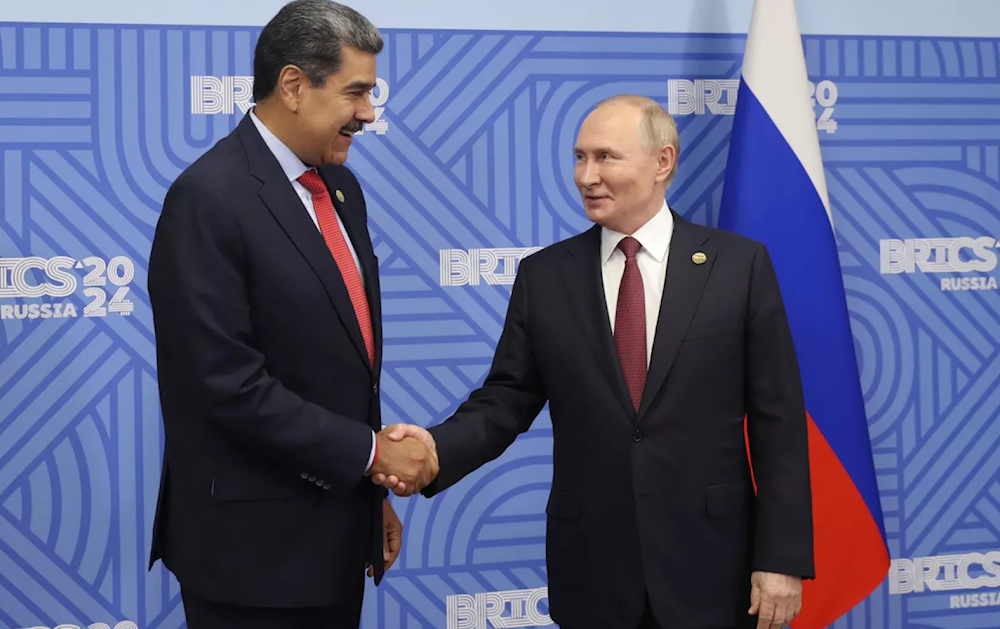Relations between Russia, Venezuela continue to strengthen: Putin
Russia and Venezuela are working to create a new international order free of neocolonial methods, according to Putin.
-

Russian President Vladimir Putin and Venezuelan President Nicolas Maduro during their meeting on the sidelines of the 16th BRICS summit in Kazan, Russia on October 23. 2024. (AP)
Russian President Vladimir Putin said that relations between Russia and Venezuela are improving.
Putin stated, during a meeting with Venezuelan President Nicolas Maduro on the margins of the BRICS conference on Wednesday, that "Venezuela is one of Russia's historical reliable partners in Latin America and the world as a whole. The relations of strategic partnership between our countries continue to strengthen."
Russia and Venezuela are working to create a new international order free of neocolonial methods, according to Putin, who also stated that Venezuela supports Russia in the midst of a hybrid war fought against it. The Russian leader also expressed support for Venezuela's bid to join BRICS. Maduro described the meeting with Russia's president as "extraordinary," claiming that they discussed a path for bilateral cooperation.
Maduro told Russian media that in addition to friendship, there is "strong cooperation" between both countries, describing how both are committed to the concept of a new multipolar world. Maduro said he complimented the Russian president for holding a "historic" BRICS conference, describing the group as "an epicenter of changes, which will lead to a new world order."
Russia to focus on three themes in BRICS
The 16th BRICS Summit kicked off on Tuesday in Kazan, Russia, and is set to continue until October 24. According to Russian media reports, the summit will host 36 nations, including 22 presidential delegations and leaders from six international organizations.
As the incoming chair for 2024, Russia plans to focus on three key themes during its presidency: politics, security, and cooperation in economic, financial, humanitarian, and cultural areas. To support these objectives, Moscow has organized over 200 political, economic, and social events aimed at enhancing collaboration among BRICS nations.
Discussions at the summit are expected to include the establishment of a digital payments platform, known as the BRICS Bridge, as well as strategies to boost trade using national currencies. This summit is particularly significant as it is the first gathering since five additional nations—Egypt, Iran, the United Arab Emirates, Saudi Arabia, and Ethiopia—joined BRICS in January 2024.
Putin aide confirms 13 nations eyed for BRICS expansion: Reuters
Reuters reported on Wednesday that BRICS leaders are drafting plans to further expand the alliance amid concerns about the geopolitical and economic implications of rapid growth.
During the BRICS summit, chaired by Russian President Vladimir Putin in Kazan, discussions focused on how to manage the growing interest from countries in the Global South and East in joining the bloc.
BRICS, which originally consisted of Brazil, Russia, India, China, and later South Africa, now accounts for 45% of the global population and 35% of the world’s economy. More than 30 states have also expressed interest in becoming members.
Yuri Ushakov, Putin's foreign policy aide, noted the complexities of further expansion, saying, "We will need to talk to them about their degree of readiness to join either full-fledged membership in BRICS, or in some appropriate form." He further confirmed to Reuters that 13 countries have been identified as potential candidates for expansion.
The BRICS summit also addressed pressing global issues, including the war in Ukraine. Indian Prime Minister Narendra Modi publicly called for peace, while Chinese President Xi Jinping held closed-door talks with Putin about the conflict.
The final BRICS communique is expected to include references to peace proposals from China and Brazil, which have been advocating for a ceasefire at the UN.
While Putin expressed openness to these proposals, he reiterated that Russia would not trade away the territories it has claimed in the Donbass and Crimea.
The summit concluded with Putin asserting that the growing interest in BRICS reflects the failure of Western efforts to isolate Russia, and that BRICS will continue to play a pivotal role in reshaping global alliances.

 4 Min Read
4 Min Read








